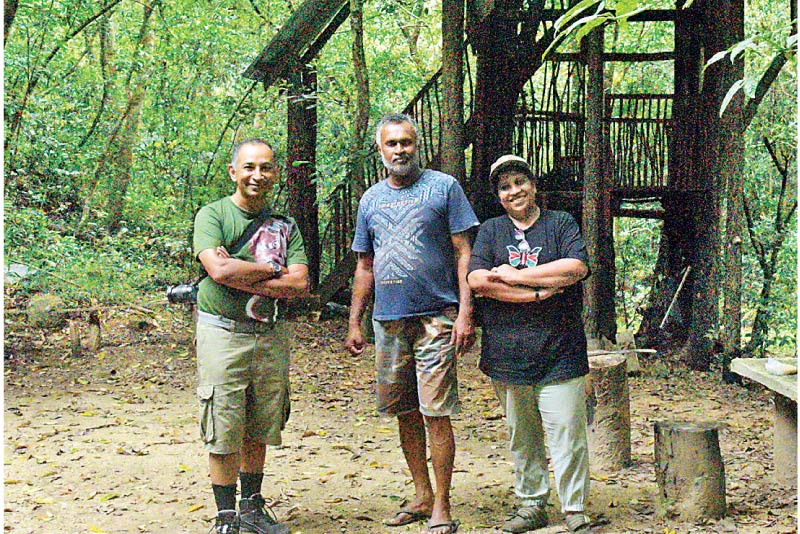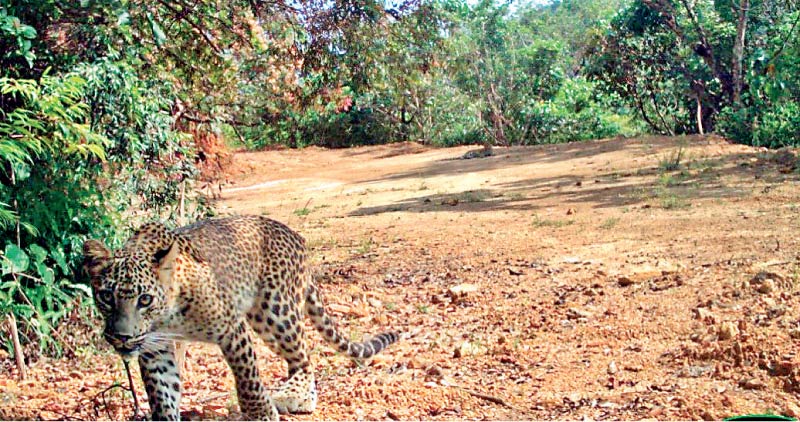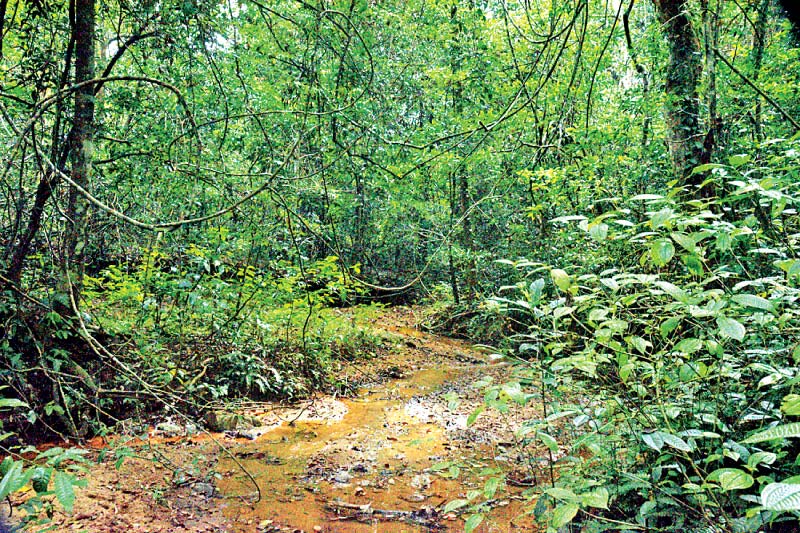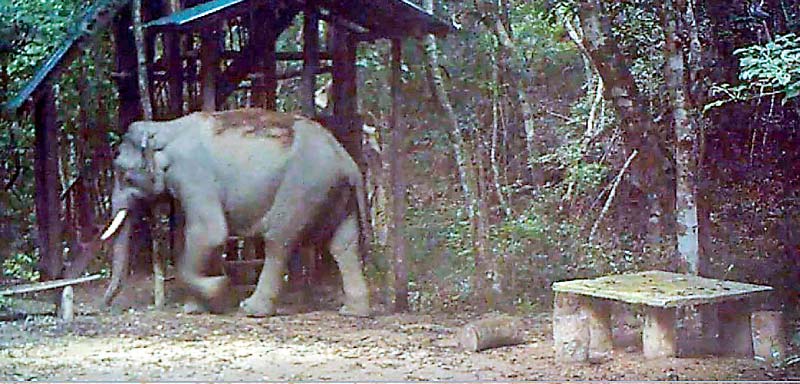Sunday Feb 22, 2026
Sunday Feb 22, 2026
Thursday, 13 July 2023 00:18 - - {{hitsCtrl.values.hits}}

Conservation Biologists Professor Enoka Kudavidanage with PLANT Chair Sriyan De Silva Wijeyeratne and TERN Co Chair Ravindra Amarasinghe
|
For researchers and students, it is a living laboratory that offers many research opportunities
|
PLANT (Preserving Land and Nature (Guarantee) Ltd., an affiliate of the WNPS (Wildlife and Nature Protection Society) envisioned Emerald Trails as a series of continuous wildlife corridors linking the major wildlife hotspots in the endemic rich southwest of the country.
Through an endeavour initiated by PLANT, an extremely critical wildlife passage was purchased in Bundulwela in the Ratnapura district recently. It was a long journey undertaken by PLANT, who managed to raise the required funds with major financial support from the Quick Response Fund for Nature (www.quickresponsefund.org), along with the Vikram and Nikhil Lissenburgh Trust and another international donor. This land is nestled between two large protected forest areas and the Uwa Kosgama village. The area falls under a Tropical Rainforest (Af) climate according to the Copen Geiger climate classification and is recognised as a critical wildlife habitat. Leopards, Elephants including Tuskers, barking deer, mouse deer, Pangolins and many other threatened species use this property as part of their network of natural trails. The forest also harbours a rich array of birds, reptiles, amphibians and invertebrates.
At site, the Tropical Ecosystem Research Network (TERN) was providing oversight and custodianship, enabling field research and data gathering, deploying camera traps to scientifically monitor animal behaviour, providing field research training to students, and safeguarding the land. TERN is a registered non-profit organisation, dedicated to biodiversity conservation and environmental protection in Sri Lanka, through facilitating research, education, conservation, sustainable development and community outreach. As the Camera trap images show (courtesy of TERN) this is a critical connecting route for a range of species. A small structure had already been built for research purposes. TERN will actively continue to play their prior roles, with WNPS teams and PLANT bringing in added resources and networks to help further strengthen the ongoing conservation work.
Private-sector led conservation efforts have gained traction and many state actors, local private actors, and global stakeholders now play active roles in this sphere worldwide. Successful models all over the globe come in varied designs, and private game reserves in South and East Africa is one model that uses tourism as a viable source of income to sustain conservation efforts. Parties like The Nature Conservancy, Rainforest Trust, The Royal Society for the Protection of Birds (RSPB) and the National Trust in the UK are just a few leading examples of entities who have approached land protection for conservation through several different models. In Sri Lanka, a pioneering partner centric mixed model is being pursued PLANT. Private and Corporate landowners work with PLANT to demarcate land as dedicated conservation spaces or gift land outright as conservation pockets to PLANT - and these are helping to create different wildlife corridors. Partners and individuals also donate funds towards land acquisition, enabling PLANT to continue acquiring specific lands which are high in biodiversity.
A hotspot for biodiversity, Sri Lanka is considered the richest in Asia for species concentration. Unplanned development, illegal land grabs and tree felling, roadways cutting through sensitive landmasses, overexploitation of sanctuaries, and destruction of rainforest and mangroves are all causing untold chaos on Sri Lanka’s fragile ecosystems.
Speaking with great excitement on the newest acquisition after visiting the location, WNPS Immediate Past President Spencer Manualpillai stressed the need for continuous connecting forest areas to reduce interactions and confrontations between villagers and wild animals. Having seen a recent elephant resting site right at the top of the forested property during his ascent, Spencer was emphatic that historic movement pathways of animals indeed deserve nurturing and protection, and both state forests and private lands could come together to form that critical chain. Given the stunning variety and density of flora and fauna of Sri Lanka, he also mentioned that there is a long way to go in making villagers surrounding forests and protected areas more aware and appreciative of these resources, and felt it was our collective role to help them develop sustainable livelihoods that would positively impact environmental and economic development.
PLANT Chairman Sriyan de Silva Wijeyeratne expressed his sincere thanks to the critical donors who helped secure this gem of a location and said he was proud to have such parties support the ambitious but challenging task that PLANT had undertaken. He also thanked the PLANT and WNPS teams, who are working selflessly to protect threatened forest and habitats. He indicated that reforesting and forest enrichment, biodiversity assessment, research, and community interaction were some of the next steps envisioned for this location.
PLANT has already ensured that more than 2,500 acres of land are dedicated through MoUs and direct acquisitions, for conservation and restoration. With local resources on ground, PLANT is working on creating sustainable ecosystems with local communities, to ensure the forested areas are conserved and protected.
Speaking about the property, Conservation Biologists Professor Enoka Kudavidanage said, “Belihuloya is a melting pot of species from the dry, wet, and montane zones. Even small forest patches harbour many species of ecological importance. Budunwela is unique due to its wide array of habitat types; namely, riverine habitats, grasslands, and intermediate zone forests rich in many endemic plants, set up in a nice elevational gradient. Budunwela provided much-needed resources and a haven for many animal species. For researchers and students, it is a living laboratory that offers many research opportunities. The original private ownership of the land placed it in immediate danger of being purchased for development, which would have been ecologically detrimental. It is the need to safeguard the property that initially attracted TERN to it, followed by the PLANT initiative. This also highlights the critical need to identify and safeguard similar forest areas for conservation and to increase the connectivity in the human-dominated landscape.”
PLANT works with a range of partners and most recently, PLANT entered into an MoU with Hayley’s Corporation, who demarcated large tracts of land with the objectives of enriching forest ecosystems and developing forest corridors, etc. Currently PLANT operates in sixteen locations and in partnership with Penn International Impact Consulting (PIIC) of the Wharton Business School, www.plantsl.org was created earlier this year. PLANT was established in 2020 by WNPS as a Not-for-Profit company to raise funds, to acquire and/or set aside privately owned lands, directly or through Partners, for the purpose of conservation and holding land in Trust on behalf of future generations.

Many threatened species use this property as part of their network of natural trails

Sensitive Budunwela land

Critical connecting route for a range of species